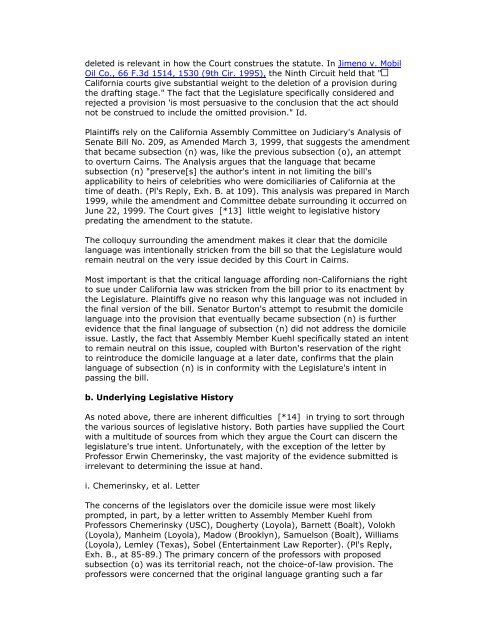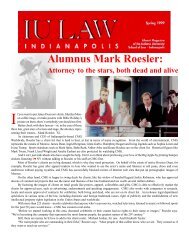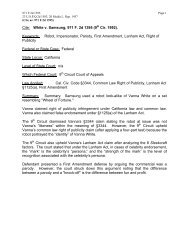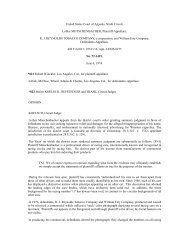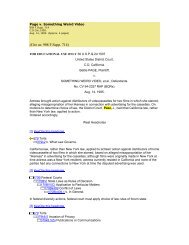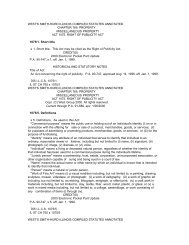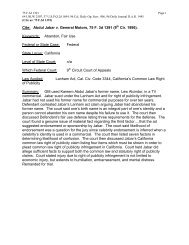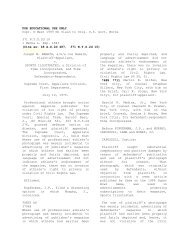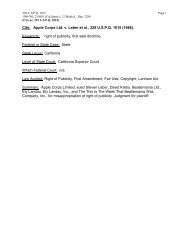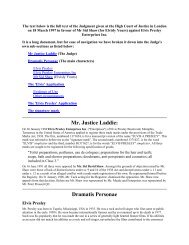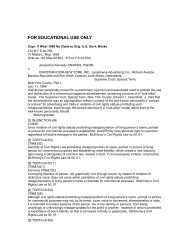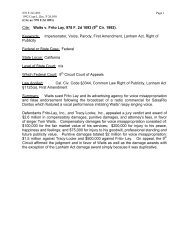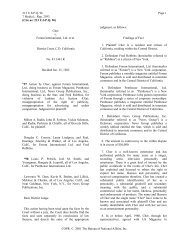Cairns v. Franklin Mint Company - Mark Roesler
Cairns v. Franklin Mint Company - Mark Roesler
Cairns v. Franklin Mint Company - Mark Roesler
Create successful ePaper yourself
Turn your PDF publications into a flip-book with our unique Google optimized e-Paper software.
deleted is relevant in how the Court construes the statute. In Jimeno v. MobilOil Co., 66 F.3d 1514, 1530 (9th Cir. 1995), the Ninth Circuit held that "California courts give substantial weight to the deletion of a provision duringthe drafting stage." The fact that the Legislature specifically considered andrejected a provision 'is most persuasive to the conclusion that the act shouldnot be construed to include the omitted provision." Id.Plaintiffs rely on the California Assembly Committee on Judiciary's Analysis ofSenate Bill No. 209, as Amended March 3, 1999, that suggests the amendmentthat became subsection (n) was, like the previous subsection (o), an attemptto overturn <strong>Cairns</strong>. The Analysis argues that the language that becamesubsection (n) "preserve[s] the author's intent in not limiting the bill'sapplicability to heirs of celebrities who were domiciliaries of California at thetime of death. (Pl's Reply, Exh. B. at 109). This analysis was prepared in March1999, while the amendment and Committee debate surrounding it occurred onJune 22, 1999. The Court gives [*13] little weight to legislative historypredating the amendment to the statute.The colloquy surrounding the amendment makes it clear that the domicilelanguage was intentionally stricken from the bill so that the Legislature wouldremain neutral on the very issue decided by this Court in <strong>Cairns</strong>.Most important is that the critical language affording non-Californians the rightto sue under California law was stricken from the bill prior to its enactment bythe Legislature. Plaintiffs give no reason why this language was not included inthe final version of the bill. Senator Burton's attempt to resubmit the domicilelanguage into the provision that eventually became subsection (n) is furtherevidence that the final language of subsection (n) did not address the domicileissue. Lastly, the fact that Assembly Member Kuehl specifically stated an intentto remain neutral on this issue, coupled with Burton's reservation of the rightto reintroduce the domicile language at a later date, confirms that the plainlanguage of subsection (n) is in conformity with the Legislature's intent inpassing the bill.b. Underlying Legislative HistoryAs noted above, there are inherent difficulties [*14] in trying to sort throughthe various sources of legislative history. Both parties have supplied the Courtwith a multitude of sources from which they argue the Court can discern thelegislature's true intent. Unfortunately, with the exception of the letter byProfessor Erwin Chemerinsky, the vast majority of the evidence submitted isirrelevant to determining the issue at hand.i. Chemerinsky, et al. LetterThe concerns of the legislators over the domicile issue were most likelyprompted, in part, by a letter written to Assembly Member Kuehl fromProfessors Chemerinsky (USC), Dougherty (Loyola), Barnett (Boalt), Volokh(Loyola), Manheim (Loyola), Madow (Brooklyn), Samuelson (Boalt), Williams(Loyola), Lemley (Texas), Sobel (Entertainment Law Reporter). (Pl's Reply,Exh. B., at 85-89.) The primary concern of the professors with proposedsubsection (o) was its territorial reach, not the choice-of-law provision. Theprofessors were concerned that the original language granting such a far


